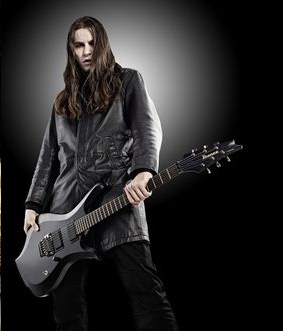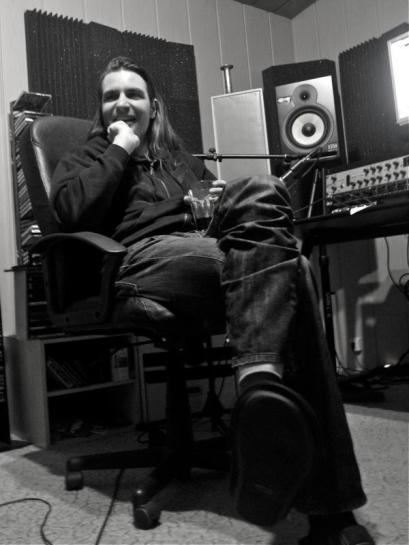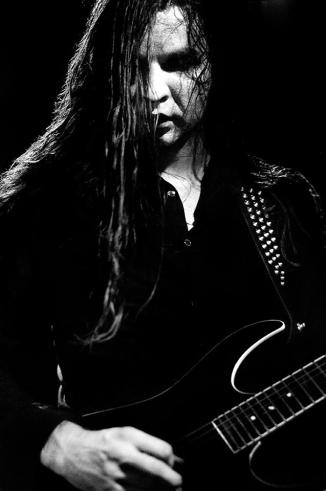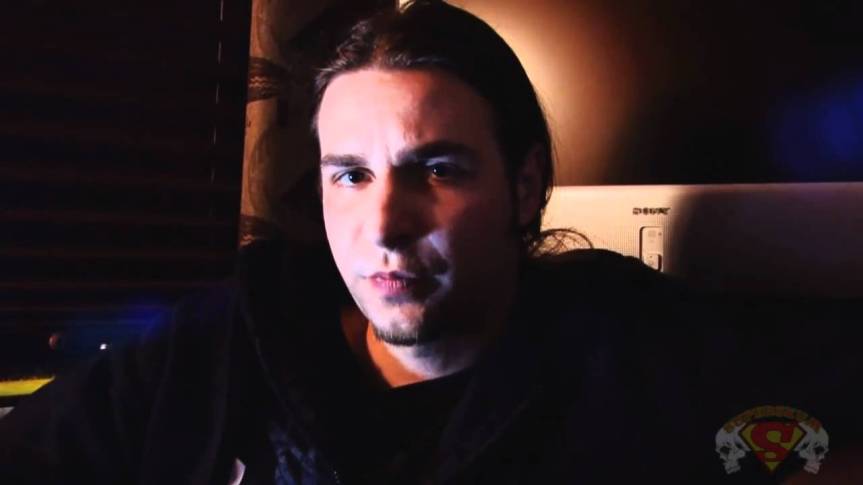 Nov. 15, 2016
Nov. 15, 2016
Victor Bullok, most lovingly known as V. Santura, is an alchemist of sound.
“You just all of a sudden get inspired by what you hear,” he said. “you just need to be open for it.”
His recording and production prowess is as revered as his public profile; the man who crafts Black Metal, both beautiful and brutal, for himself, his comrades, and the world. Aside from his own work in Triptykon and Dark Fortress, he was the master behind the glass for Alkaloid’s celebrated debut, The Malkuth Grimoire; Schammasch’s stunning Contradiction and this year’s award-winning, Triangle; as well as Secrets of the Moon, Hannes Grossmann’s solo work, and many others.
When they enter Santura’s sanctuary, Woodshed Studio, located in a conveniently remote patch of Munich, they are each embraced with individual attention and expertise. And it’s this approach that sets him apart from other Metal producers today. He explains, “Basically I try not to do the same thing all the time. I think it’s very important that you work individually with every band. Every band needs something different. If the band really has to sound necro, then we would try for a real necro sound. But, if a band needs a very, very polished or precise sound, then I would go for that.”
“I try to capture the identity of the musician…I’m taking full advantage of all modern studio techniques. But, after all, I want to hear musicians playing.”
 Santura’s path was laid out before him in the most kismetic sense. Though accustomed to his father’s exclusive playing of classical music, it was when his older brother brought home that sweet, sweet noise of distorted guitar that the a teenage Santura woke up. “As soon as he started listening to this music I was just attracted by the sound like moths are attracted by light…it was like magic for me I fell in love with it.”
Santura’s path was laid out before him in the most kismetic sense. Though accustomed to his father’s exclusive playing of classical music, it was when his older brother brought home that sweet, sweet noise of distorted guitar that the a teenage Santura woke up. “As soon as he started listening to this music I was just attracted by the sound like moths are attracted by light…it was like magic for me I fell in love with it.”
“I would still say that Slayer and Metallica are huge influences on me, subconsciously,” he said. “I don’t know if you hear it in my music, but when I started playing the electric guitar, I got the Reign in Blood tab book and started playing all the songs. That helped my understanding of playing rhythm guitar…so those bands still have a big meaning for me.”
The music then as compared to today, he says, “There is so much music and it’s just a bit too much, I think. But, what can you do? Who am I to say to a band did they shouldn’t or don’t have the right to play the music?
Sometimes there’s something coming out that stands out from the masses. But I’m a kid of the nineties. What came out of that time was super exciting for me. Now that I’m a bit older, I’m a bit bored.”
Still, as determined the young and love-struck Santura was to grasp his craft, he was always far too practical to ever trust making sound as a principle means to make a living. So, he had determined early on that there was just as much value to be involved on the ‘left-brained’ side as much on the ‘right.’
“When I had my very first band back in the day, we tried to record our first shitty demo. A schoolmate classmate of mine had a 4-track mini disc recorder and I was sitting down with the manual, checking the thing out start a recording so it came quite naturally. I got this idea that I wanted to become a sound technician already when I was finishing High School because I thought I would like to work with music, but I don’t want to be dependent on it only as a musician or instrumentalist.”

However, that is not to diminish his influence as a composer or axeman. Some of his most extraordinary work comes from the fretboard as much as the soundboard. His prowess is unmistakable on Dark Fortress’ 2014 release, Venereal Dawn and he attributes that to his being “in a very brilliant creative mode that I can I came up with lot of ideas that were just coming by naturally,” as well as simply not being as interested as playing as fast as humanly possible for the sake of it.
He also attributes his composing growth to his production approach. He notes, “If you listen to an album like Eidolon, I think this album I ignored the band a little bit because for everybody else, it was very hard to play and tough recording sessions to get everything on tape. Nowadays, I’m much better at this.”
Today, however, between his schedule at Woodshed, just helping his mates, Secrets of the Moon on tour with Behemoth, and getting laid up with sickness in between, his Muses are not as active as they were last year – though, certainly not on vacation. “Today, I have a lot of ideas as I said before, but they just come more natural. I didn’t have to force them which was really nice. I just basically sitting down in the evenings with a guitar and started playing things that I like and then from there.”
As for a future Dark Fortress release, he says, “It’s still a little too early. The thing is actually, I have a lot of ideas for the new album — like seven or eight songs in a row. But, so far, it’s just in my head. I haven’t I didn’t have the time to record any demos, which I wanted to do for the entire year.”
 Another challenge, of course, is to ensure that he doesn’t have the further challenge of both entities, Dark Fortress and Triptykon, (his band with Celtic Frost legend, Tom Warrior), do not release albums at the same time, again, which took a heavy toll on Santura, in spite of their concurrent successes. Venereal Dawn and Melana Chasmata, respectively, both won worldwide critical acclaims, making the international Metal news network “top” 2014 lists.
Another challenge, of course, is to ensure that he doesn’t have the further challenge of both entities, Dark Fortress and Triptykon, (his band with Celtic Frost legend, Tom Warrior), do not release albums at the same time, again, which took a heavy toll on Santura, in spite of their concurrent successes. Venereal Dawn and Melana Chasmata, respectively, both won worldwide critical acclaims, making the international Metal news network “top” 2014 lists.
“I don’t want to make a hundred percent promise. There is a lot of studio work for me. Also, the same goes for Triptykon.”
In the meantime, what he would really like to see moving forward is more sound and less noise.
“I would like see bands try to sound like they’re making music again. People want to hear musicians playing…the key factor is just to express yourself instead of try to copy somebody else.”

